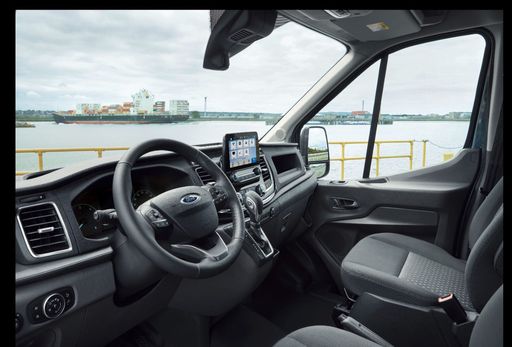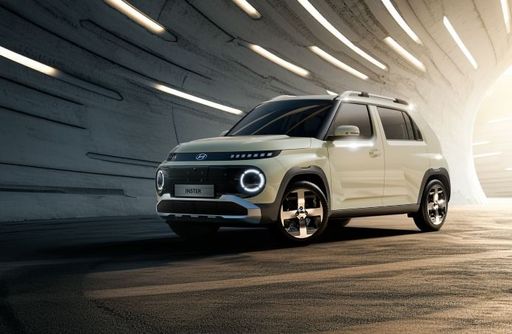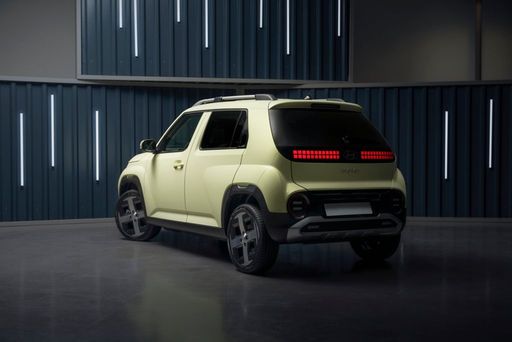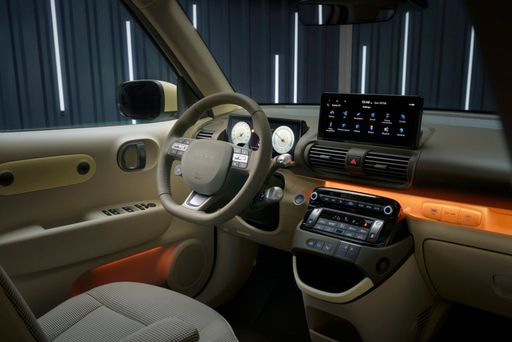Ford Transit Connect VS Hyundai Inster – Specs, Efficiency & Price Comparison
Find out now which car fits your needs better!
The Ford Transit Connect (Cargo Van) is powered by a Diesel or Plugin Hybrid engine and comes with a Manuel or Automatic transmission. In comparison, the Hyundai Inster (SUV) features a Electric engine and a Automatic gearbox.
When it comes to boot capacity, the Ford Transit Connect offers , while the Hyundai Inster provides 280 L – depending on what matters most to you. If you’re looking for more power, you’ll need to decide whether the 150 HP of the Ford Transit Connect or the 115 HP of the Hyundai Inster suits your needs better.
There are also differences in efficiency: vs 14.30 kWh. In terms of price, the Ford Transit Connect starts at 26200 £, while the Hyundai Inster is available from 20500 £.
Compare all the key specs now and find out which model fits your lifestyle best!
Ford Transit Connect
The Ford Transit Connect is a versatile compact van that seamlessly combines functionality with a comfortable driving experience. Its spacious interior is designed to accommodate both passengers and cargo, making it an ideal choice for small businesses and active families alike. With its efficient engine and agile handling, the Transit Connect offers a reliable and economical option for urban and suburban driving.
details @ media.ford.com
@ media.ford.com
 @ media.ford.com
@ media.ford.com
 @ media.ford.com
@ media.ford.com
Hyundai Inster
The Inster has quickly captured the attention of automotive enthusiasts with its striking design and dynamic performance. This model seamlessly blends advanced technology with comfort, making it an ideal choice for both daily commutes and adventurous road trips. With its spacious interior and innovative features, the Inster promises an exhilarating driving experience that doesn’t compromise on practicality.
details @ hyundai.news
@ hyundai.news
 @ hyundai.news
@ hyundai.news
 @ hyundai.news
@ hyundai.news

|

|
|
|
|
Costs and Consumption |
|
|---|---|
|
Price
26200 - 41500 £
|
Price
20500 - 25800 £
|
|
Consumption L/100km
-
|
Consumption L/100km
-
|
|
Consumption kWh/100km
-
|
Consumption kWh/100km
14.3 - 15.1 kWh
|
|
Electric Range
-
|
Electric Range
327 - 370 km
|
|
Battery Capacity
19.70 kWh
|
Battery Capacity
42 - 49 kWh
|
|
co2
-
|
co2
0 g/km
|
|
Fuel tank capacity
32 - 50 L
|
Fuel tank capacity
-
|
Dimensions and Body |
|
|---|---|
|
Body Type
Cargo Van
|
Body Type
SUV
|
|
Seats
2 - 5
|
Seats
4
|
|
Doors
4
|
Doors
5
|
|
Curb weight
-
|
Curb weight
1380 - 1433 kg
|
|
Trunk capacity
-
|
Trunk capacity
238 - 280 L
|
|
Length
4500 - 4868 mm
|
Length
3825 - 3845 mm
|
|
Width
1855 mm
|
Width
1610 mm
|
|
Height
1856 - 1860 mm
|
Height
1575 - 1610 mm
|
|
Payload
-
|
Payload
317 - 357 kg
|
Engine and Performance |
|
|---|---|
|
Engine Type
Diesel, Plugin Hybrid
|
Engine Type
Electric
|
|
Transmission
Manuel, Automatic
|
Transmission
Automatic
|
|
Transmission Detail
Schaltgetriebe, Automat. Schaltgetriebe (Doppelkupplung)
|
Transmission Detail
-
|
|
Drive Type
Front-Wheel Drive
|
Drive Type
Front-Wheel Drive
|
|
Power HP
102 - 150 HP
|
Power HP
97 - 115 HP
|
|
Acceleration 0-100km/h
11.4 - 13.5 s
|
Acceleration 0-100km/h
10.6 - 11.7 s
|
|
Max Speed
175 - 186 km/h
|
Max Speed
140 - 150 km/h
|
|
Torque
280 - 350 Nm
|
Torque
147 Nm
|
|
Number of Cylinders
4
|
Number of Cylinders
-
|
|
Power kW
75 - 110 kW
|
Power kW
71 - 85 kW
|
|
Engine capacity
1498 - 1968 cm3
|
Engine capacity
-
|
General |
|
|---|---|
|
Model Year
2024
|
Model Year
2025
|
|
CO2 Efficiency Class
-
|
CO2 Efficiency Class
A
|
|
Brand
Ford
|
Brand
Hyundai
|
Ford Transit Connect
The Versatile Ford Transit Connect: An In-Depth Overview
The Ford Transit Connect has long been a staple in the light commercial vehicle market. Renowned for its versatility, efficiency, and robust build, this model offers a variety of configurations to suit different business needs. In this article, we delve into the technical specifications and innovative features of the latest iteration of this ever-popular vehicle.
Powerful Engine Options and Performance
Under the bonnet, the Ford Transit Connect offers a range of powerful and efficient engines. The standard diesel options include the robust 2.0 EcoBlue Diesel engines, available with either manual or automatic transmissions. For those seeking a greener option, the Transit Connect also offers a 1.5 EcoBoost PHEV Plug-In Hybrid with a 150 PS output. This array of options ensures that drivers can choose a powertrain that best suits their performance requirements and environmental considerations.
Advanced Design and Dimensions
In terms of design, the Transit Connect is engineered for practicality without sacrificing aesthetics. Measuring between 4500 mm and 4868 mm in length, and 1855 mm in width, it is well-suited for urban environments while offering ample cargo space. The vehicle’s height spans from 1856 mm to 1860 mm, providing a spacious interior that is both comfortable and functional for drivers and passengers alike.
State-of-the-Art Features and Specifications
Technology and convenience feature prominently in the Transit Connect’s offerings. The latest model includes refined details and equipment lines like Limited, Trend, and the more feature-rich Active Automatik. Its advanced infotainment system, safety features, and driver assistance technologies work harmoniously to enhance both driving experience and passenger safety.
Additionally, the vehicle boasts a battery capacity of 19.7 kWh in the hybrid variant, enabling impressive electric-only ranges for day-to-day journeys. The inclusion of dual-clutch automatic transmission in certain models significantly enhances driving dynamism and reduces fuel consumption.
Fuel Economy and Driving Range
The Transit Connect impresses with its fuel economy, particularly in its hybrid iteration. With a fuel tank size of 50 litres and the efficiency of hybrid technology, the vehicle assures drivers of fewer stops at filling stations and more time spent on the road. Despite its commercial nature, it manages to achieve competitive emission figures, an important factor for eco-conscious businesses.
Versatility in Configuration
One of the standout features of the Ford Transit Connect is its adaptability. Available in different configurations, this model can accommodate between two and five passengers, making it suitable for both cargo transport and passenger services. Its flexibility extends to the range of available options for customisation, ensuring it can be configured for various business and personal needs.
Conclusion
The Ford Transit Connect continues to lead the market with its blend of robust performance, innovative features, and adaptability. Whether used for urban delivery, passenger transport, or any number of other commercial applications, the Transit Connect fulfills its role effectively, embodying Ford’s commitment to quality and performance.
With its combination of traditional internal combustion and hybrid powertrains, the Transit Connect addresses both modern environmental concerns and longstanding demand for reliable utility workhorses, making it a noteworthy option for businesses and families alike.
Hyundai Inster
The automotive landscape continues to evolve, and at the forefront of this transformation is the Hyundai Inster, a dynamic model set to impress electric vehicle enthusiasts. As a compact SUV, the Inster embodies a blend of innovative technology, user-friendly features, and an eco-conscious design, making it a contender in the burgeoning electric vehicle market.
Powertrain and Performance
The Hyundai Inster is powered by an efficient electric drivetrain, offering two main battery options: a 42 kWh and a 49 kWh version. These options translate to power outputs of 97 HP and 115 HP, respectively, allowing drivers to choose based on their performance needs. The Inster accelerates from 0 to 100 km/h in 11.7 seconds for the 42 kWh variant, while the more powerful 49 kWh model reaches the same speed in an impressive 10.6 seconds, showcasing Hyundai's commitment to delivering engaging performance.
Range and Efficiency
One of the standout features of the Inster is its electric range. The 42 kWh model provides a range of 327 km, while the 49 kWh variants extend the range to 360 km and 370 km. This remarkable efficiency is complemented by consumption figures of 14.3 kWh/100 km for the 42 kWh variant and 14.9 kWh/100 km for the 49 kWh options. These figures ensure that the Inster is not only suited for city driving but also capable of handling longer journeys with ease.
Dynamic Design and Comfortable Interior
Aesthetically, the Hyundai Inster boasts a sleek and modern look, featuring a compact SUV profile that is both sporty and practical. The dimensions, measuring between 3825 mm and 3845 mm in length, with a width of 1610 mm and heights ranging from 1575 mm to 1610 mm, contribute to its spacious and comfortable cabin. The interior accommodates up to four passengers, making it an ideal choice for small families or couples.
Innovative Features
The Inster incorporates advanced technology geared towards enhancing the driving experience. Its automatic transmission, utilizing a reduction gearbox, ensures seamless gear shifts. Additionally, drivers will appreciate the array of smart features designed for convenience and connectivity, including advanced infotainment systems and driver assistance technologies.
Sustainability Credentials
Hyundai is dedicated to sustainability, and the Inster is a testament to this philosophy. With a carbon footprint of zero emissions, the Inster falls into the A CO2 efficiency class, making it a responsible choice for eco-conscious consumers. The absence of traditional emissions positions the Inster not only as an economical option but also as a proactive step towards reducing our environmental impact.
Conclusion
The Hyundai Inster stands out as a versatile and innovative solution in the electric vehicle segment. With a balanced approach to performance, efficiency, and sustainability, it caters to the modern driver’s needs and reflects the automotive industry's shift towards electrification. The future looks bright for the Inster, as Hyundai continues to pave the way for greener driving experiences.
The prices and data displayed are estimates based on German list prices and may vary by country. This information is not legally binding.
